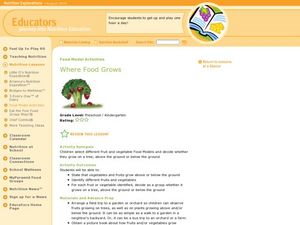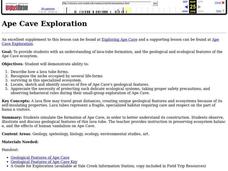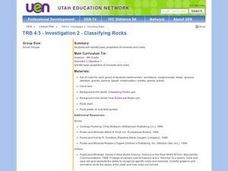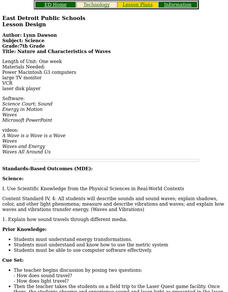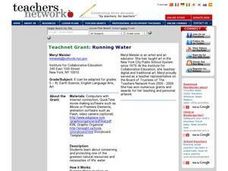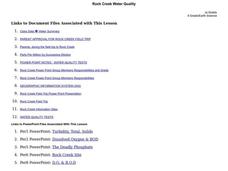Curated OER
Photodocumentation: Promoting Environmental Education Through the Development of Visual Literacy Skills
Young scholars construct a photo document on their selected topic and use at least twelve photographs in their photo document. One must be of the authors. Additionally, they must write five interactive questions which help viewers...
Curated OER
Where Food Grows
Students identify how vegetable plants grow. In this plant lesson, students brainstorm different fruits and vegetables and read the book Growing Vegetable Soup. Students visit a garden and observe how vegetables grow.
Curated OER
Utilizing Community Resources
Learners gain an understanding of scientific methods and use process skills (such as observing, classifying, and predicting) to solve a problem. They develop an understanding of the need for natural preservation.
Curated OER
Ape Cave Exploration
Students simulate online the formation of Ape Cave, in order to better explain its construction. They observe, illustrate and discuss geological features of this lava tube.
Curated OER
Coho Salmon Enhancement
Learners build a fish trap across a small stream. The purpose of the trap is to collect baseline data of Oncorhynchus kisutch, Coho salmon, smolt numbers coming out of a spring-fed pond. Other biological data also be measured.
Curated OER
Investigation 2 - Classifying Rocks
Fourth graders identify basic properties of minerals and rocks. They access websites and utilize worksheets imbedded in this instructional activity to further their understanding of rock classification.
Curated OER
Nature and Characteristics of Waves
Seventh graders research different types of waves, identify the parts of a wave and create a Power Point presentation demonstrating what they have learned.
Curated OER
Big Fat, Juicy Worms
Pupils collect and study information about worms. They discover how an earthworm helps process and loosen the soil. They write in their journals as well.
Curated OER
Nothing New? A Physical Change
Fifth graders discuss the differences between chemical and physical changes. In groups, they complete experiments and discover how a physical chnage can be reversed. To end the lesson, they review the steps of the water cycle and...
Curated OER
The Bulbs: Camas and Daffodil
Fourth graders become aware of the importance of the camas bulb to the Nez Perce people, they learn the parts of plants, and gain understanding of the interdependence of Nature. They study about the possible causes and outcomes of global...
Curated OER
Petroglyphs: Protecting the Past
Fourth graders investigate the three types of rocks and study about petroglyphs. They explore why petroglyphs were used by the Nez Perce People. Students investigate the properties of the three types of rocks and they discuss cultural...
Curated OER
Running Water
Sixth graders create products that feature the importance of water conservation. In this environmental stewardship lesson, 6th graders explore the water cycle and conduct on water usage. Students also research water pollution and...
Curated OER
Growth of a Bean Documented by Child and Camera
Third graders photograph the growth of a bean plant and keep a daily written journal of observations. They drew, graphed and took notes on the plant growth which they compared to the photographic journal.
Curated OER
Pond Ecology
Fifth graders examine pond ecology, testing how temperature affects the respiration rate of fish. They collect various living things found at a pond, and identify the animal and plant life discovered. They observe a pond community in an...
Curated OER
The Importance of Trees in the Rural Area: Planting a Snowfence
Students explore the concept of living snowfences. In this tree instructional activity, students read, "The Living Tree," brochure and discuss the ecological benefits of planting trees to create living snowfences. Students draw plans for...
Curated OER
What Does it Take to be a Survivor: Part 2
Students explore adaptation by completing worksheets. In this fish anatomy lesson, students identify the different survival strategies fish utilize to live in the ocean and the adaptation their bodies have gone through over millions of...
Curated OER
Can You Find Me Now?
Students locate points using longitude and latitude coordinates. They locate their home using longitude and latitude, explore the uses of GPS, and accurately use a GPS.
Curated OER
Take A Walk On The Wildside
Students study big cats in a variety of lessons included in this unit.
Curated OER
Rock Creek Water Quality
Ninth graders test water in a local creek using chemical kits and probes. They take GPS readings and digital photographs. They calculate the Water Quality Index and create a spreadsheet.
Curated OER
Observing and Recording Biological Data
Students create their own definition of life. They identify the eight characteristics of life in organisms. They compare and contrast the characteristics of living and nonliving things.
Curated OER
Energy in a Clean Environment
Students examine the efficiency of each alternative energy source as well as what limitations exist in terms of extracting the usable energy. They determine which energy source is most effective to the economy and the environment in the...
Curated OER
Animal Adaptations
Tenth graders participate in an arthropod scavenger hunt. In groups of two, they identify and collect two specimens of arthropods in the school area, and create a table of all the specimens and what class they belong to.
Curated OER
Maple Syrup
Middle schoolers comprehend the process of making pure maple syrup. They identify differences between pure syrup and artifical maple syrup. Students are asked what is in the displayed containers. They sample the syrups and try to figure...
Curated OER
Water, Water Everywhere
Students observe and describe ways water is used in their homes and communities. They determine the source of their water. Students determine ways they can save and protect their water.
Other popular searches
- Science Field Trips Lessons
- Science Field Trips
- Science Virtual Field Trips
- Science Museum Field Trip
- Science Zoo Field Trip
- Field Trip Science Kits

